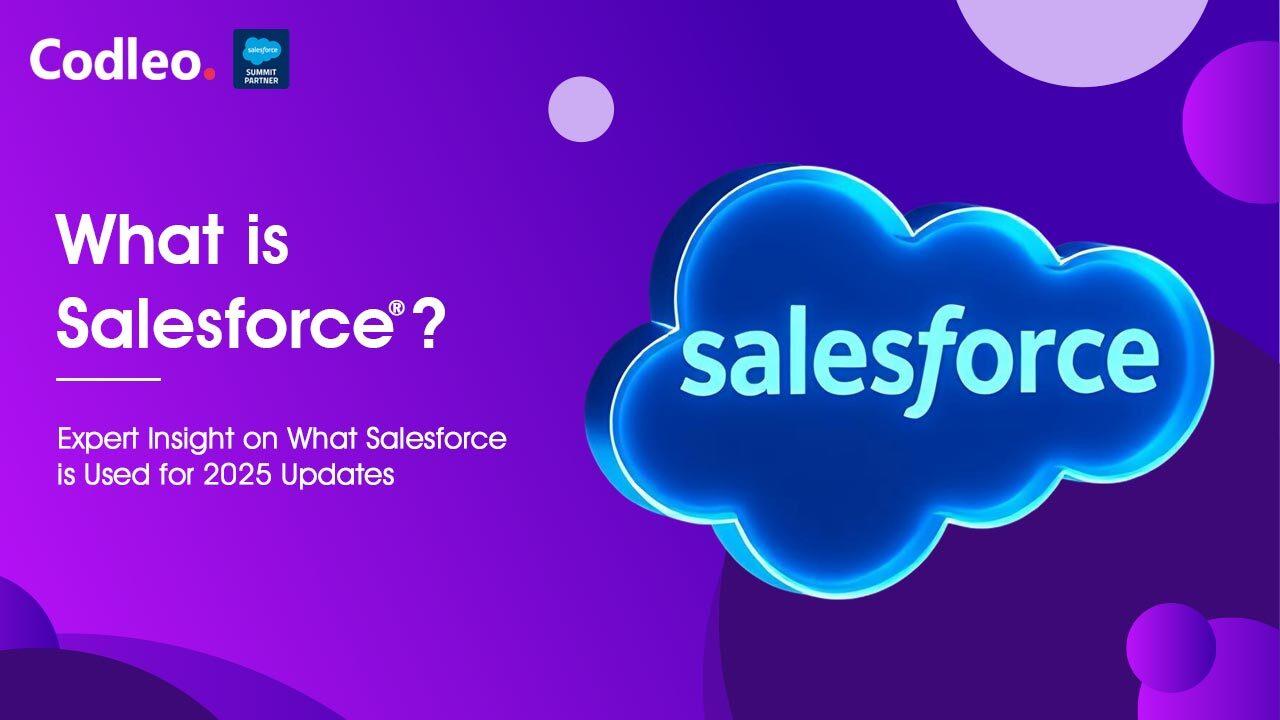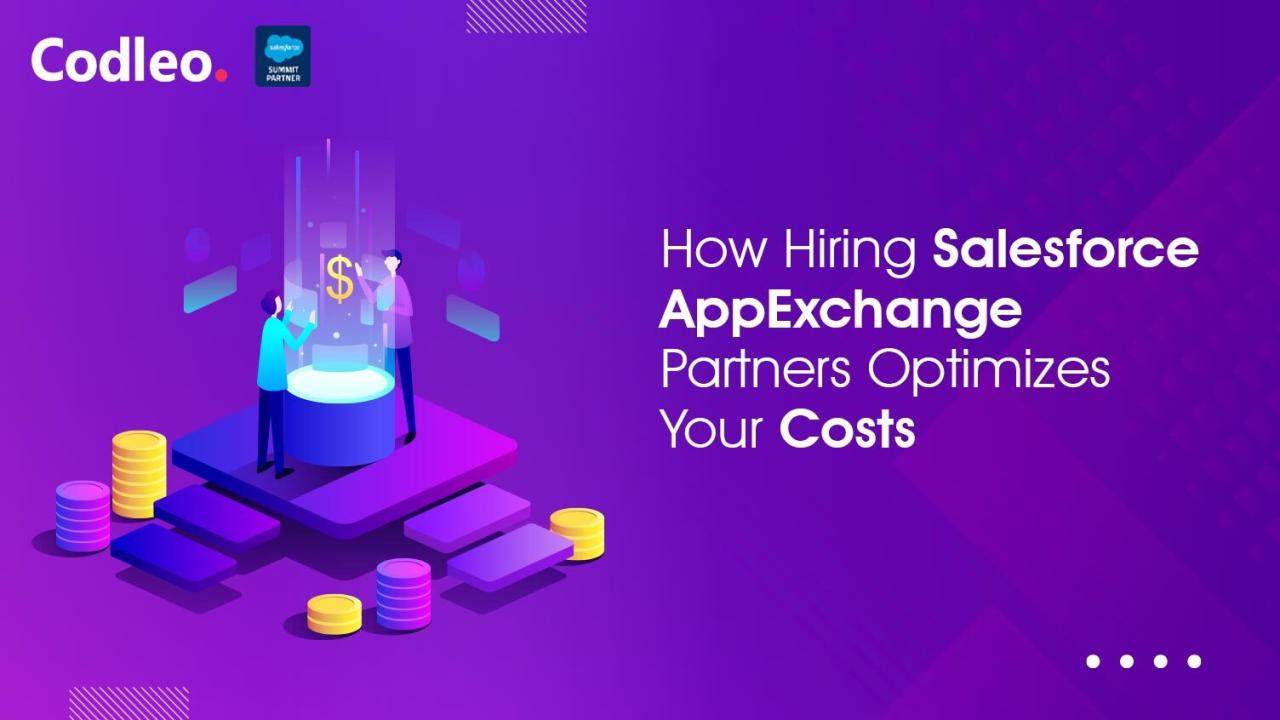Publish date:
If you haven't been looking into customer relationship management (CRM) software, you may not know what Salesforce is or what it can do for you.
If you're curious about the top CRM systems or thinking about using them in your organization, this guide will help you understand key questions. We’ll explain what Salesforce is, what it’s used for, and what benefits it offers.”
Let’s explore this topic together.
What is Salesforce?
Salesforce is an extensive system of tools that help teams in marketing, sales, commerce, service, and IT connect with their customers. It focuses on managing customer relationships effectively.
Salesforce began as a company that offered software over the Internet (SaaS). It has since expanded to provide a platform for building applications (PaaS).
Customers can purchase a ready-to-use Salesforce CRM system and create framework components (Lightning components) and custom apps using the Salesforce Lightning platform (Force.com). They can also become Salesforce partners and sell these software products on the AppExchange marketplace.
Salesforce wants users and companies to understand its platform better. To this end, it encourages everyone to explore its online training hub, Trailhead. Users can find educational resources like the “Salesforce Platform Basics” learning module and get expert support from the Trailblazer Community.
Who Uses Salesforce?
Salesforce has over 150,000 customers worldwide, including small and large companies. It works behind the scenes for major businesses like American Express, Sony, Coca-Cola, Charles Schwab, and TD Ameritrade.
The top customer relationship management (CRM) software is Salesforce, holding 23% of the market. It is used in many areas, including nonprofits, mining, transportation, real estate, and agriculture. No matter the industry, Salesforce is used.
The top companies that use Salesforce are:
-
Walmart Inc.
-
Amazon Web Services
-
Toyota
-
Cannon
-
The New York Post
-
American Express
-
The American Red Cross
-
Deloitte and others.
The company is well-known for buying other companies and products. Recently, it has acquired ClickSoftware, Mulesoft, and Tableau.
Why do many businesses, from small start-ups to large Fortune 500 companies, use Salesforce?
To better understand this topic, let's first explore the history of Salesforce and the CRM market.
A Bit of Salesforce & CRM Background
Customer Relationship Management (CRM) is a technology that helps companies improve their relationships with customers and potential customers. CRM software allows businesses to stay connected with their customers, simplify tasks, and increase profits.
Salesforce, one of the first cloud computing companies, changed technology and the CRM industry in 1999. What made it different? Salesforce provided its software through Internet browsers instead of relying on company-hosted servers. This approach lowered costs for building, installing, maintaining, and supporting the software.
This platform allows users to access their software anywhere, not just in the office. Salesforce combines easy-to-use, the ability to grow with your needs, and online access to data from any location on Earth. These features made Salesforce very popular and helped it become a global leader in the market.
OK, But What is Salesforce Used for?
Salesforce offers various cloud platforms that help you manage different data and serve your customers differently.
Despite offering many products, customer relationship management (CRM) remains the core of Salesforce's business. It is tailored for various industries within Salesforce Clouds.
Let’s discover these significant products.
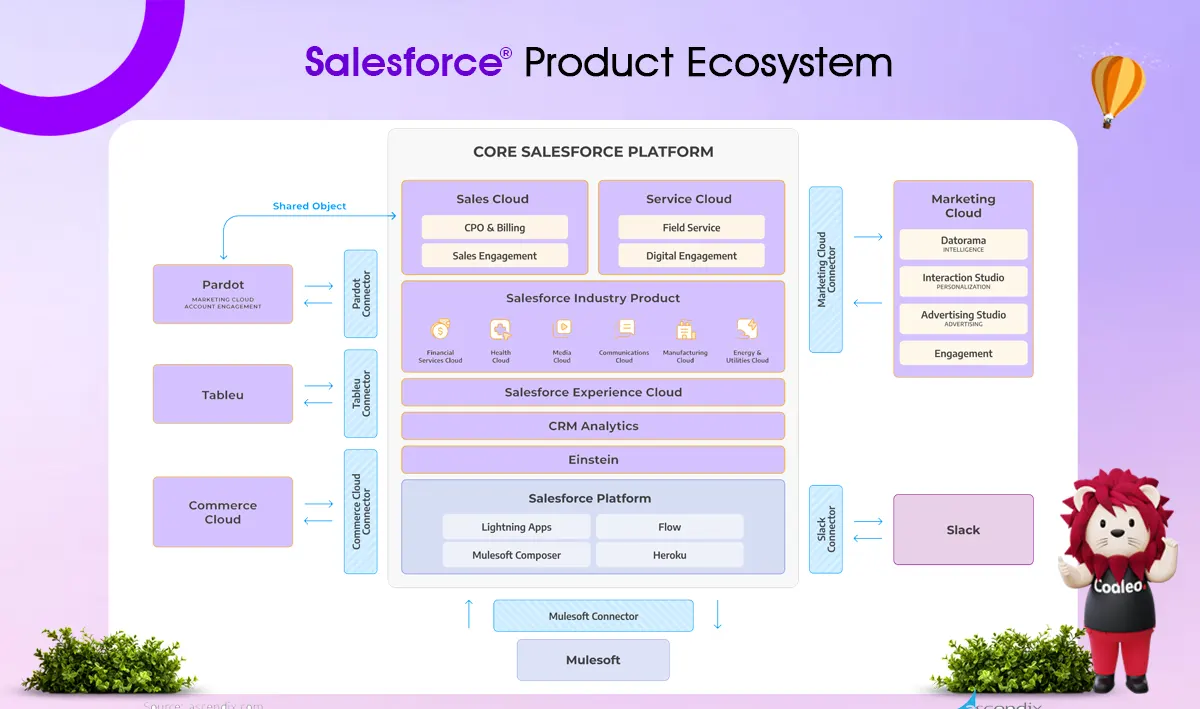
What is Salesforce Sales Cloud?
Sales Cloud is a CRM platform and is Salesforce’s first and most popular product. It helps organizations manage their sales. Initially, it was made for B2B (Business-to-Business) companies to guide potential customers through a sales cycle. Now, B2C (Business-to-Consumer) companies can also use Sales Cloud.
Its main built-in objects include:
-
Lead (People who showed interest in your products or services.)
-
Account (companies that you want to track)
-
Contact (employees of the companies you want to follow)
-
Opportunity (Possible deals that could lead to a new business your sales team supports.)
You can turn a Lead into an Account, Contact, or Opportunity. An Opportunity can also go through different stages and have various chances of success. Additionally, Sales Cloud offers built-in tools for creating quotes and predicting opportunities.
Add custom fields to all standard objects to make them relevant to your business. For example, if you offer different services or products, you should create a space to track your Leads' interest in those products.
Task tracking and workflow automation in the Sales Cloud can help you automatically create tasks based on specific criteria. For instance, when you make a new Lead, the system can generate a series of functions for you to call or email that Lead.
Salesforce Sales Cloud can be improved with the following tools and features: Salesforce Sales Engagement (formerly known as High-Velocity Sales), CPQ/CPQ+, Billing Growth/Plus, Sales Cloud Einstein, Salesforce Contracts, Marketing Cloud Account Engagement, Revenue Intelligence, Einstein Conversion Insights, Sales Enablement, Salesforce Maps/Territory Planning, Sales Emails and Alerts, Partner Relationship Management, External Apps, Einstein Relationship Insights, Sales Dialer for Essentials, Social Intelligence, and Quip Advanced.
Our Salesforce consultants help you find the best ways to implement Sales Cloud. With Codleo’s expert help, you can improve your organization’s productivity using a well-designed CRM solution that fits your needs perfectly.
What is Salesforce Revenue Cloud?
Salesforce Revenue Cloud has two main products: CPQ and Billing.
Salesforce CPQ stands for “Configure, Price, Quote.” It was acquired in 2015 when Salesforce purchased Steelbrick. With CPQ, customers can sell complex sets of Salesforce products. It offers more features than basic Opportunities, Products & Quotes functions.
Product and pricing rules and a quote-generating tool help salespeople create accurate quotes for complex products.
Salesforce Billing helps you complete the customer Order-to-Cash process. This product handles billing, generates invoices, processes payments, and recognizes revenue after the quote is finalized.
Advanced Revenue Cloud
This cloud supports complex Quote-to-Cash tasks beyond what standard Salesforce CPQ, Billing, and Subscription Management products can handle.
This cloud helps with advanced approvals, standalone orders, multi-cloud billing, finance logging, managing customer assets throughout their lifecycle, tax handling, and integrating customer storefronts.
What is Salesforce Service Cloud?
Salesforce Service Cloud is a platform that helps your company’s customer service and support team.
This system helps customers track their cases and resolve issues faster. They can communicate through email, live chat, or phone, making it easier to get help.
Service Cloud lets users create self-service customer service portals and provides automated responses for specific situations, making communication easier.
Its standard features include:
-
Case Management
-
Ticket Assignment
-
Queue Management
-
Live Chat
-
Knowledge Base
You can improve the basic features with social networking tools that help you manage your online brand reputation. These tools allow you to monitor and respond to customer posts. Additionally, Service Cloud works well with phone systems and can be integrated easily. This is especially helpful for large companies with significant customer service centers.
You can enhance Salesforce Service Cloud by using the following tools: Field Service, Salesforce Contact Center, Self-Service Customer Community, Service Intelligence, Digital Engagement, Service Einstein, Service Cloud Voice, Salesforce Feedback Management, Customer Lifecycle Analytics, Salesforce Survey Response Pack, Salesforce Scheduler, and Appointment/Visual Remote Assistant.
What is Salesforce Marketing Cloud?
The Marketing Cloud is a strong digital marketing platform for B2C and B2B marketers. It helps you connect with your customers and track their journey across different communication channels. You can manage your social media, email promotions, digital ads, content creation, and data analysis all in one place.
You can market to your customers through email, SMS, social media, and digital ads. You can also engage with your customers and specific content. You can customize your marketing efforts using different built-in creation tools in the Marketing Cloud.
You can enhance the Salesforce platform with Marketing AI, advanced engagement reports, field-level encryption, and Google Analytics 360 integration for the Marketing Cloud.
The Salesforce Marketing Cloud includes several products, so let’s discuss them individually.
Marketing Cloud Account Engagement, also known as Pardot.
Pardot is Salesforce’s tool for B2B email marketing automation. It helps businesses send emails to potential customers on behalf of their sales teams and allows users to create landing pages and forms. The tool is designed to qualify leads, which are passed to sales representatives.
Pardot works best for smaller databases that have high-value sales. It can connect with Sales Cloud or other CRM systems. You can enhance Pardot's main features with Sales Emails, Alerts, Engagement History Dashboards, and B2B Marketing Analytics Plus.
Marketing Cloud Engagement
MC Engagement, previously called Core Messaging/Journeys, helps businesses create personalized experiences across different channels during the customer journey. It also includes advanced tools for managing campaigns effectively.
It keeps messaging consistent across all marketing channels and creates customer journey maps that range from simple to complex. This helps with ongoing improvement and easy reference.
Marketing Cloud Engagement combines all the features of the Marketing Cloud package: Email, Mobile, and Web Marketing Suite. This includes email personalization, content building and tagging, and audience segmentation.
Marketing Cloud Advanced Cross Channel (also known as Advanced Cross Channel)
Advertising Studio helps you manage and target your digital marketing campaigns.
Distributed Marketing and Marketing Cloud Connect offer a managed package you can install in your CRM system. This allows teams of advisors, partners, and others to view, customize, and send content directly from the CRM.
You can add Distributed Marketing content blocks to your Marketing Cloud. This helps your team collaborate effectively. With Marketing Cloud, teams of all sizes can reliably engage with their customers and manage their business at scale.
Einstein for Marketing helps marketers make every customer interaction effective. It provides tools to understand customers better using predictive insights. Marketers can create personalized messages and content and get suggestions on the best times and ways to engage with customers.
Marketing Cloud Customer Data Platform (also known as Customer 360 Audiences)
The MC Customer Data Platform, formerly called Salesforce DMP and Customer 360 Audiences, is part of the Salesforce Marketing Cloud product lineup.
This platform focuses on using data to improve digital marketing. It helps you combine your customer data to better connect with your audience. Customer 360 Audiences allows you to create specific groups of customers and customize your messages for each group you want to reach.
Marketing Cloud Personalization (also known as Interaction Studio)
Marketing Cloud Personalization improves customer engagement. It helps you understand your customers' wants, make decisions automatically, and adjust the AI algorithms that drive your personalization strategies.
It delivers personalized experiences across different marketing channels throughout the customer journey. This approach helps you manage campaigns and ensures your message is consistent across channels.
Marketing Cloud Intelligence, also known as Datorama.
Marketing Cloud Intelligence lets you connect, analyze, and act on all your data in one marketing dashboard. It helps improve your return on investment (ROI), increase speed, and support business growth.
Loyalty Management
In January 2021, Salesforce introduced loyalty management to help businesses engage with and reward their customers.
Companies can easily create loyalty programs using clicks instead of coding. They can develop systems like tiered memberships or points for each purchase.
You can set up loyalty management with Experience Cloud and Marketing Cloud to sign up clients and deliver content.
Data Cloud
Salesforce Data Cloud is a high-quality system for managing data in the cloud. It solves problems that arise from having customer data spread across different clouds, platforms, and storage options. Based on Salesforce's Customer Data Platform (CDP), Data Cloud has developed many strong features.
-
Data Unification gathers, organizes, and combines customer data from different sources, such as CRM systems, marketing tools, customer service platforms, and external providers such as AWS or Snowflake. This creates a complete and relevant 360-degree view of customer profiles.
-
Data Management. Data Cloud keeps customer data accurate, complete, and up to date. It ensures quality by validating and integrating data with all relevant systems.
-
Data Activation. Teams can use Data Cloud features across different clouds and platforms in any work setting.
Data Cloud connects seamlessly with Salesforce's metadata framework and is a key part of the Einstein 1 Platform, which combines data and artificial intelligence. Companies don’t have to worry about mishandling their internal data. Salesforce sets high-security standards with each new release, and Data Cloud also follows these standards. Salesforce works closely with the Office of Ethical and Humane Use, uses an advanced Trust Layer for data handling, and strictly follows all regulations.
What is Salesforce Experience, also known as Community Cloud?
The Experience Cloud is a social platform that helps people work together and create custom portals. It allows your organization to manage communication among employees, partners, and customers in one place. You can also use the Community Cloud to share documents, images, and other data in real-time.
Experience Cloud works well with Sales Cloud, Service Cloud, and App Cloud. You can customize it to meet your business needs. Community Cloud allows you to automatically gather data and images from Salesforce, saving you time managing content.
Using digital engagement, Einstein Bots, mobile publisher for Experience Cloud, experience analytics, CPQ for partner experience, and distributed marketing for partners can enhance the main features of Experience Cloud.
What is Salesforce Commerce Cloud?
The Commerce Cloud provides excellent features to help you serve your customers well, whether they are online or offline. It also removes the need for your business to manage complex technical plans and allows you to integrate customer data, helping improve the customer experience.
If you want to give your clients a positive and engaging experience, Commerce Cloud is the best choice.
-
B2C Commerce helps businesses connect with modern shoppers through centralized marketing, service, and order fulfillment. Companies can use a complete set of commerce APIs, developer tools, and built-in features.
-
B2B Commerce allows businesses to order online. It reduces costs by providing a self-service portal for B2B Commerce.
-
D2C Commerce helps businesses reach customers around the world. It handles busy times using AI-driven merchandising, boosting revenue and customer engagement. The platform offers ready-to-use direct-to-consumer templates that make setting up and improving customer outreach easy. It also provides product recommendations through advanced algorithms to personalize suggestions, which increases customer satisfaction and sales efficiency.
-
Salesforce Order Management is an easy-to-use system that helps businesses manage customer orders after a purchase. It connects shopping and customer service to create a great buyer experience. This platform allows companies to use different languages, currencies, and local options to serve their customers better.
-
Connected Commerce makes starting both B2B and D2C sales channels easy, allowing for a smooth and integrated approach to different markets. Its Salesforce Payments feature provides a safe and simple transaction process, improving the overall efficiency of your commerce operations.
What is Salesforce Analytics Cloud?
Salesforce Analytics Cloud has two main products: Einstein and CRM Analytics. These tools are designed for different cloud services.
The Einstein product family includes two main tools: Einstein Discovery and Einstein's Next Best Action. Einstein Discovery automatically finds important patterns in customer data, while Einstein Next Best Action shows actions based on specific criteria.
CRM Analytics, previously known as Tableau CRM, helps Salesforce CRM users gain valuable insights and make data-driven decisions using AI-powered analytics.
What are the solutions for education (also known as Education Cloud)?
Salesforce offers a robust feature set for educational institutions like:
-
Education projects can benefit from the Advancement Solution with Alum 360. This solution helps build lasting relationships with alumni and donors.
-
Marketing and Communications, previously known as Engagement, focuses on creating large-scale personalized connections with Student 360.
-
Recruitment and Admission focuses on providing a seamless experience using Student 360.
-
Student Success focuses on improving the student experience. It aims to increase engagement, facilitate collaboration, and provide the proper support when needed.
What are Nonprofit Solutions, also known as Nonprofit Cloud?
Nonprofit Solutions offers tools for fundraising, building relationships, and measuring the impact of funds. It also includes project management for volunteers and ways to connect with more people through various channels. Additionally, it offers solutions for managing grants.
Nonprofit Cloud is a user-friendly platform for nonprofit organizations to use Salesforce features easily.
Salesforce Nonprofit Cloud includes:
-
The Nonprofit Success Pack (NPSP) is essential to the Nonprofit Cloud. It includes features and tools designed for nonprofits, such as managing donors, tracking donations, and overseeing programs.
-
Manage grants with our system. This includes tracking applications, overseeing awards, and handling reports.
-
Use Batch Management to process and track large groups of donations, memberships, or other transactions.
-
Manage donor relationships, track gifts, recognize contributions, and ensure proper stewardship.
-
We manage programs to track important outcomes like service delivery, engagement with constituents, and impact assessment.
-
Manage and track fundraising campaigns, events, and marketing activities.
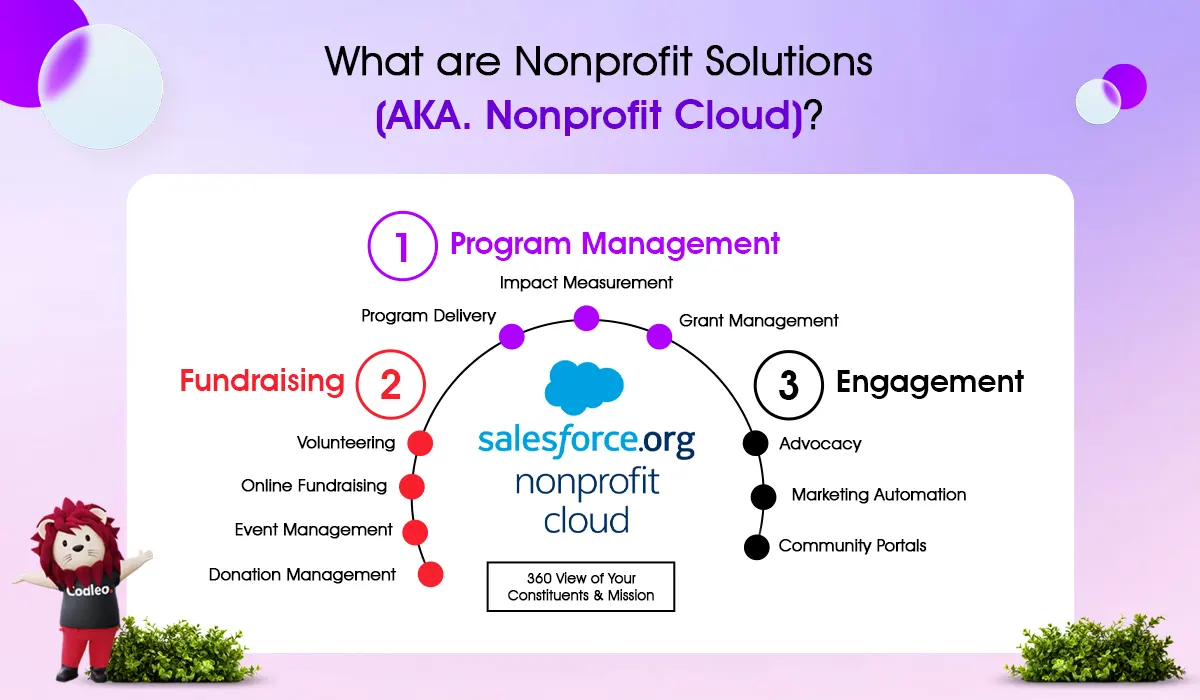
Salesforce is not free for nonprofits, but they can get a good discount through Salesforce.org. Eligible nonprofits can receive 10 free licenses and more deals through the Power of Us Program.
Well-designed Salesforce solutions can help nonprofit organizations tackle big problems like disorganized fundraising, handling data manually, poor volunteer management, and complicated grant and donation processes. An experienced Salesforce nonprofit consultant will ensure that Salesforce Nonprofit Cloud is easy to use so that staff and volunteers can fully utilize the platform's features.
Salesforce AI
Salesforce offers three types of AI: predictive, generative, and conversational. For example, Salesforce's predictive AI is part of Sales AI, which uses machine learning to analyze data and predict future trends, customer behaviors, and possible opportunities. Now, let’s explore the features of Salesforce AI Cloud.
Salesforce AI has gathered a few helpful solutions under its umbrella:
-
Sales AI helps automate everyday sales tasks. It handles data entry, sending follow-up emails, and scoring leads. It also creates personalized sales pitches and replies to customer questions.
-
Service AI helps chatbots talk with customers and solve their problems. It automates routine service tasks and offers personalized support.
-
Marketing AI creates high-quality, personalized content quickly. It also automates content optimization and improves how businesses segment and target their customers.
-
Commerce AI creates product descriptions, gives recommendations, and compiles reviews. It also helps organize products automatically and improves search and filtering by using AI-based suggestions.
-
Slack AI helps create chatbots that automatically respond to common questions.
-
Tableau AI creates data stories and visualizations automatically. It helps people analyze and explore data more easily, streamlines report generation and summarizes data using AI-driven insights.
-
Flow AI creates automated workflows and business processes using a simple trigger-action system described in natural language. For example, you can say, “When an opportunity is won (trigger), send an email to the group (action).”
-
Apex AI creates automated Apex code for custom business logic and integrations. It helps developers work more efficiently and reduces the need for manual testing and debugging.
What is Agentforce?
Agentforce is the top Salesforce AI product. It has evolved from being called Einstein Copilot. This change is not just a rebranding; it brings significant improvements. Previously, Einstein Copilot acted as an assistant, similar to an AI chatbot on the side of the screen. Agentforce combines Einstein Copilot with Einstein Copilot Studio, a low-code environment. This studio lets developers create, launch, and manage AI models without needing deep knowledge of machine learning.
Salesforce users can now add another team member directly within Salesforce. You can create agents to serve as sales coaches, customer service consultants, or marketing advisors—whatever you need—agent force USD for each interaction.
You can use more than Agentforce to enhance your Salesforce experience with AI. The Codleo team can help you choose options that fit your workflows and budget or create custom AI solutions for Salesforce.
The Einstein Trust Layer is integral to Salesforce AI and helps protect data when using AI technology. It addresses data security concerns and includes features like dynamic grounding, zero data retention, and toxicity detection.
These features set a new security standard in the industry. It allows companies to use their internal data to enhance AI capabilities without risking safety.
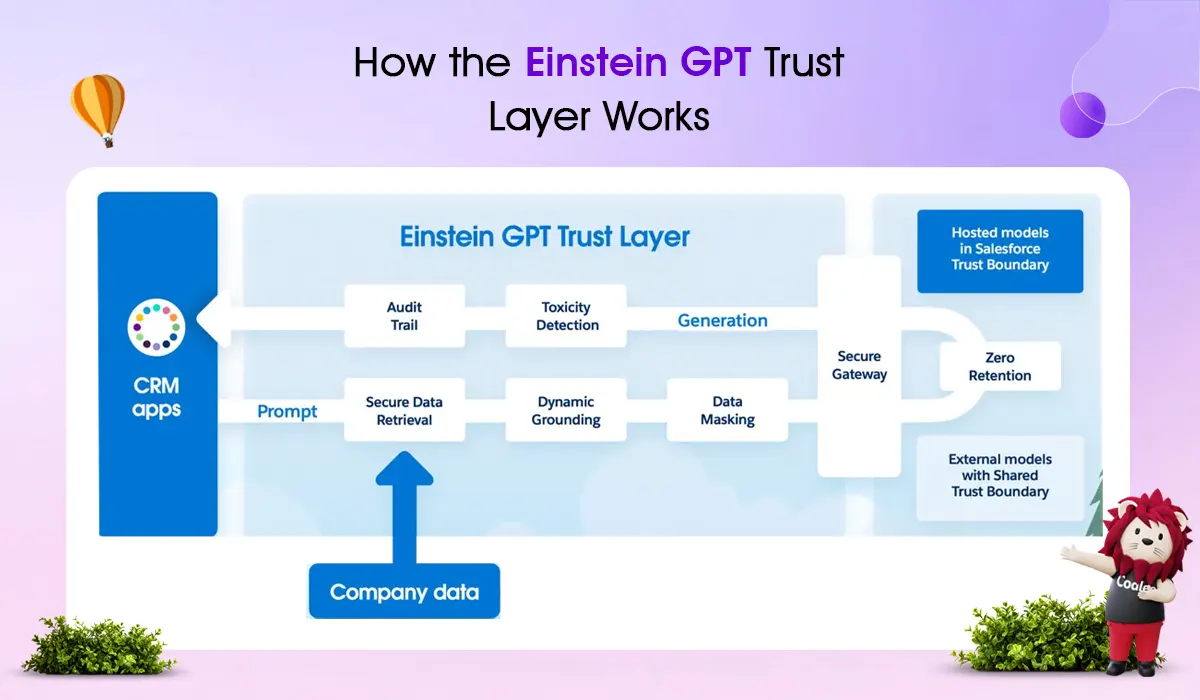
What is the Customer 360 Platform?
This platform includes a set of Salesforce tools for increased productivity and enhanced security:
-
AppBuilder: This solution makes building custom applications on the Lightning Platform easy. It covers the basics of Salesforce, including data modeling, business logic, user interface, and app deployment.
-
Heroku: This platform lets developers build, run, and manage applications entirely in the cloud. It is fully managed, meaning developers don’t have to worry about the underlying infrastructure.
-
Mulesoft: This integration platform connects Salesforce CRM with other systems and processes. It works whether your applications are on-premises, in the cloud, or a hybrid setup. Customers can easily integrate their applications within their IT environment.
-
JavaScript Designer: This tool helps you quickly build apps on Salesforce using Lightning Web Components and modern JavaScript. It covers essential JavaScript and development skills for using the Lightning Component Framework.
-
Salesforce Mobile: You can access Salesforce features on mobile devices through the Salesforce Mobile app. This includes standard and custom objects, Lightning app pages, and more. You can customize and share your app using the Salesforce Mobile Publisher or create unique experiences with Salesforce Mobile SDKs.
-
Salesforce Platform (also known as Lightning Platform and Force.com) is a PaaS solution for building and deploying cloud applications. It includes tools for automating business processes, integrating external applications, and providing responsive user interfaces.
-
Process Automation: This solution uses Flows and Process Builder to automate processes without writing code.
-
Security and Privacy help keep your apps safe. We provide tools like Platform Encryption, Event Monitoring, and Field Audit Trail. Our training covers key topics such as general security, multi-factor authentication, Shield, DataMask, Security Center, and Privacy Center.
Mulesoft (also known as Integration Cloud)
MuleSoft’s technology helps you connect quickly to any system with ready-made connectors, making it an essential purchase for Salesforce in 2018.
MuleSoft has been replaced by the Anypoint platform. This platform allows you to manage your API connections, perform integrations, monitor activities, and create reports in one cloud-based space. One of the main advantages of MuleSoft is its many pre-built connections. Using proven templates, these connections help you link to mainframes, ERP systems, and SaaS applications.
Salesforce recently launched a new version of MuleSoft called Salesforce MuleSoft Composer. It is lightweight and works well with Salesforce.
Tableau (also known as Analytics Cloud)
Salesforce bought Tableau in 2019 to enter the business analytics market. The Tableau product family includes the Tableau Platform and Tableau Content.
Tableau offers three options for its platform: on public cloud services like AWS, Azure, or GCP, on Tableau Cloud, and on local servers.
Einstein
This Salesforce product line comprises:
-
Einstein Discovery: This tool helps business users easily find essential patterns in their data. You don't need complicated data models to use it.
-
Einstein Prediction Builder: This tool helps you predict future business events without coding. You decide what to predict and select the data you want to use and where it comes from. After creating your prediction, you can check its accuracy and see essential factors in the scorecard of the Prediction Builder. This includes a detailed analysis of each factor.
-
CRM Analytics (formerly Tableau CRM): This tool works with Salesforce and helps Salesforce CRM users access clear, AI-driven insights while they work. It allows users to be more efficient, quickly identify trends, predict results, and receive AI-suggested actions, all within the Salesforce platform.
NFT Cloud
Salesforce has launched its NFT Cloud as part of its entry into Web 3.0 technology. This new platform was introduced during Salesforce’s Connections ’22 event.
With NFT Cloud, you can create, sell, and manage NFTs on the Salesforce platform, helping you engage better with clients through digital assets.
Slack
Salesforce made its biggest purchase ever when it bought Slack for $27.7 billion in December 2020.
Slack is a messaging tool for businesses. It lets you send direct messages to coworkers or join specific channels. You can create a channel for a project or your local office.
Slack offers three main products: Launch, Extend, and Migration.
Quip
Quip was bought in 2016, and Bret Taylor is now a co-CEO of the company. Quip combines features of Google Docs and Slack. It provides strong tools for creating spreadsheets and documents, focusing on teamwork.
The platform includes tools like Quip Chat, Quip Slides, and Salesforce Integration, which help you add real-time data to your document.
Industry Products (also known as Vlocity)
In 2020, the company acquired Vlocity, which focused on creating industry-specific clouds. This helped them meet the unique needs of different business sectors.
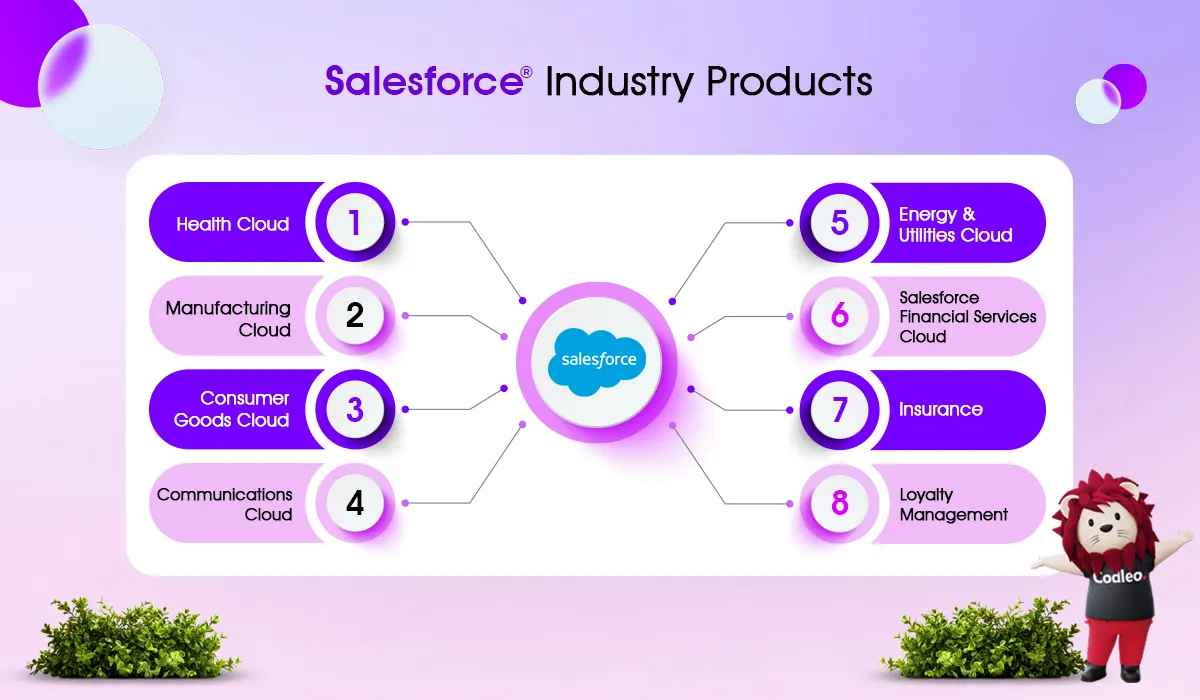
Salesforce offers specialized products to support a wide range of industries.
-
Consumer Goods Cloud
-
Communications Cloud
-
Media Cloud
-
Energy & Utilities Cloud
-
Salesforce Financial Services Cloud
-
Insurance
-
Loyalty Management
If your industry isn’t listed, visit AppExchange. This is the Salesforce marketplace where Salesforce Partners offer and sell their tools.
Why Use Salesforce?
According to Salesforce data, companies using Salesforce typically see a 34% improvement in customer satisfaction, a 32% boost in lead conversion, and a 27% increase in sales revenue. What helps these companies succeed on the platform? Let’s explore this further.
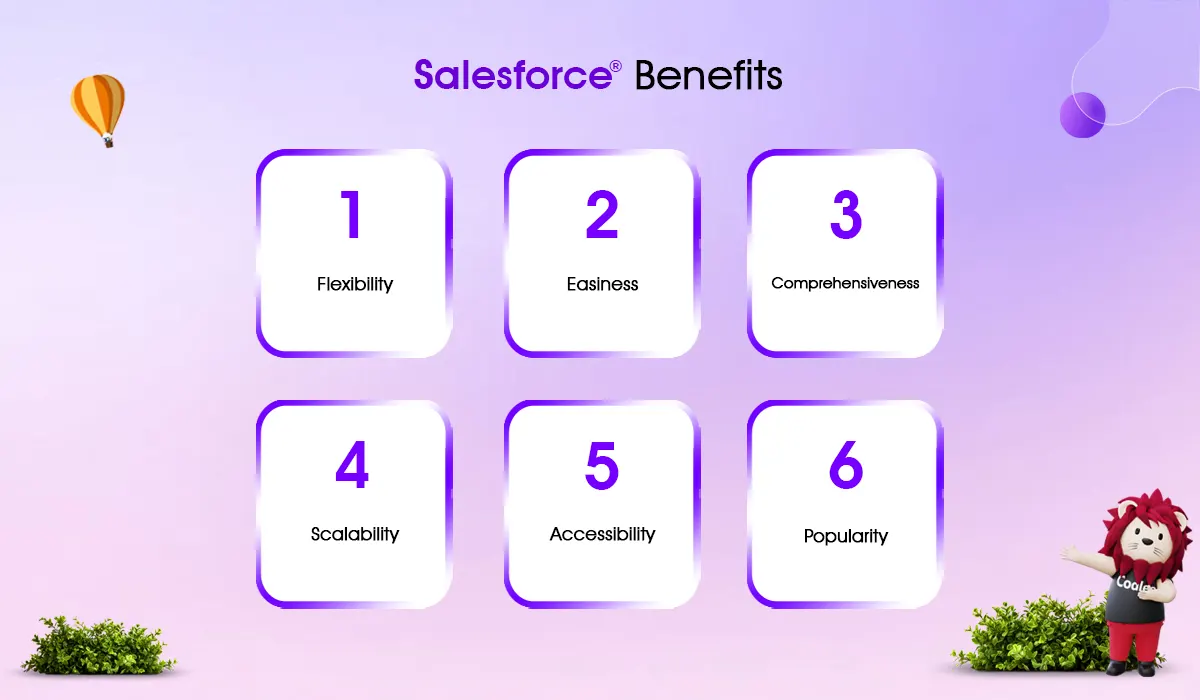
Flexibility
Salesforce is a leading CRM that focuses on innovation. It improves its products regularly to be more user-friendly, customizable, and feature-rich. The platform can be tailored to fit any business's needs. This flexibility is why over 150,000 companies worldwide have chosen Salesforce as their CRM solution.
Comprehensiveness
Salesforce is a complete system that can handle all your CRM technology needs. It has a development platform, AI tools, a big data processing engine, a collaboration portal, and an app marketplace. Salesforce can also work with other third-party tools compatible with its system.
Scalability
Your business is growing, and your Salesforce should grow with it. The Salesforce platform can expand and adapt to your needs without interrupting your software.
Accessibility
The world is becoming more mobile every day. Salesforce helps by letting you access your product from anywhere. The Salesforce Mobile App gives you a complete version of your product on your phone or tablet, just like on your desktop.
Popularity
As this platform becomes more popular, it benefits you. Why? You won't need to spend hours looking for tools that work with your product—many options already exist. You can also easily find a Salesforce expert to help deploy, optimize, configure, or customize your software because many specialists are available.
Salesforce offers many benefits, and users can find something that fits their needs. Look at what our clients say about the positive changes they experienced in their work after we helped them implement Salesforce solutions.
Key Steps to Salesforce Implementation
Implementing Salesforce can help you integrate essential business activities in one place, increasing productivity by up to 44%. Start by defining your business goals, understanding your clients' needs, and examining your competitors and customers' actions.
Salesforce can be challenging to set up and use. Hiring an experienced Salesforce consultant can help make the implementation, data migration, optimization, and customization processes more successful.
Let’s talk about the budget. Salesforce is an advanced and complex solution, so it will not be cheap. However, it is worth the cost. The expenses for implementing Salesforce can vary, but you can estimate the costs by analyzing and calculating.
After all that, a knowledgeable Salesforce implementation partner will do the rest for you:
-
Configuration and Setup
-
Testing and Quality Assurance
-
Deployment and User Training
The Bottom Line
Our Salesforce consulting services are perfect if you plan to use Salesforce CRM in your company and prefer simplicity.
Our consultants will simplify complex processes for you. At Codleo, we are ready to tackle any Salesforce challenges and help you overcome them.
We offer a wide range of Salesforce services and have over 10 years of experience in various industries. Our many satisfied clients show our dedication. To get started, contact us and share your project ideas or challenges. We are happy to offer our expertise to help you.
We specialize in the implementation, optimization, and customization of Salesforce products like:
-
Salesforce Service Cloud
-
Experience (Community) Cloud.
If you have been using CRM software and find it missing some key features, our team can help you with a CRM system audit and move to Salesforce. If you need help with implementing Salesforce, contact us. We will assist you in setting up Salesforce in your organization, training your team, and ensuring they adopt it.






